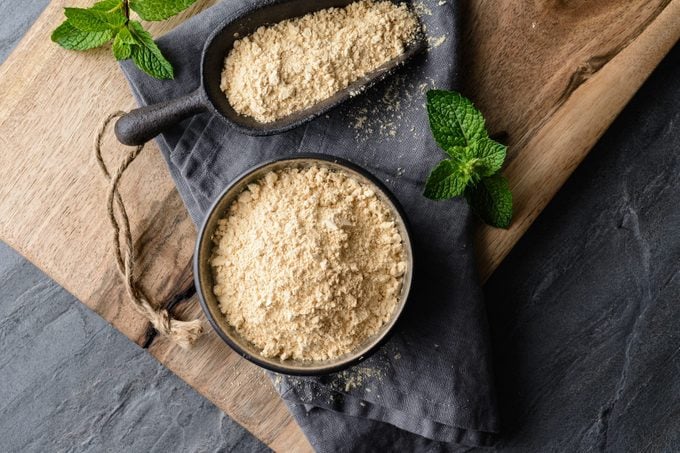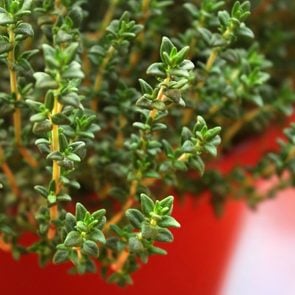10 Things Experts Need You to Know About Maca Powder
Updated: Mar. 08, 2022
Maca root powder is touted for its ability to boost libido, lift your mood, and restore energy, but is this true or just hype?
What is maca root powder?
Fatigue, low-libido, even depression—if you’ve been feeling off in the new post-Covid world, you’re not alone.
A year of quarantining and trying to avoid (or recover from) the coronavirus has left many people feeling off their peak, and looking for natural remedies to recapture their old selves again.
One such potential solution is popular in alternative medicine: maca root—and the powder from maca root.
Flora Waples, MD, medical director at Restor Medical Spa, who also works in emergency medicine, says that maca’s reported properties help explain why it’s become increasingly popular.
“Maca root has been used in the Andes by traditional healers to improve everything from infertility to libido to mood and energy level,” she says.
For people hoping to treat ailments like low-libido and sluggishness, plant-based remedies like maca root powder, tend to be more alluring compared to their traditional counterparts, like prescription drugs because they’re “natural” or not synthetic.
But when it comes to maca root, is it worth it—or is it all just hype?
We spoke with experts who reveal everything you need to know about maca root, including the science behind the plant and its alleged benefits.
Where does maca root come from?
Known as Lepidium meyenii, says Dr. Waples, maca root is an Andean plant of the mustard family and has been called “Peruvian Ginseng”. But don’t let the name fool you. “It is not actually a member of the Ginseng family,” says Dr. Waples.
It may look like a humble radish or turnip, but maca has reported powers of its own.
“Maca powder or maca root comes from drying the root of the Maca plant,” explains Dr. Waples. “Indigenous people have used it both in traditional healing, as well as to improve the fertility of their farm stock for centuries.”
The plant naturally grows between 12,000 and 14,000 feet above sea level in the Andes mountains, and is currently cultivated in Peru, Bolivia and Brazil, says she says.
Some believe that maca is an adaptogen—a class of herbs that can help your body better deal with stress, explains Rachel Eva Dew, ND, board-certified doctor of natural medicine, integrative life transformation coach, and co-founder of the integrative telemedicine platform, ModiHealth.
It’s a cruciferous vegetable like cauliflower or broccoli, says Karyn Eilber, MD, board-certified urologist at Cedars-Sinai specializing in female pelvic medicine in Los Angeles. “The most edible part is the root.”
You’ll typically find maca in powder form, such as a scoopable supplement that can be blended into drinks or smoothies.
(Check out these natural remedies for fatigue and exhaustion.)
What are the potential benefits of maca powder?
Like many popular natural medicine alternatives, reported claims and scientifically proven benefits don’t always match up.
“The Maca plant was not widely known until the 1980s, and there is still very little research on it,” says Dr. Waples.
Although the body of research is slim, it’s slowly increasing, says Dr. Eilber.
These are some of the alleged benefits of maca root. Remember, the science on the benefits of maca root in human health is limited and most research has been done on animals. Further investigation of maca root for human use is required before any recommendations can be made.
Libido?
One of maca root’s health claims is tied to its ability to boost libido. So does it really work? “Simple answer: no one knows,” says Dr. Waples.
“While claims that it improves libido and fertility have been made based on traditional uses, there have been no conclusive studies on humans at this date,” Dr. Waples says.
However, she notes that a handful of small studies on rats showed it increases fertility and sexual behaviors. “Whether or not this finding can be carried over to humans is unknown.”
Of course, devotees of maca root will swear that it really does help bring a spark back to their sex life. Interestingly, notes Dr. Waples, maca root does seem to help sperm motility, and therefore could improve fertility.
“There is a slowly growing body of evidence that indicates that maca root does improve sperm motility, which could improve fertility,” says Dr. Waples, adding, “Fun trivia fact: this effect seems most pronounced in Alpacas. However, much work remains to be done and the exact molecular mechanism of this is still not certain.”
Erectile dysfunction?
Another popular maca claim: its ability to treat erectile dysfunction. But from a scientific point of view, the jury’s still out.
A 2016 review of various clinical trials published in the journal Maturitas on the improvement of semen quality found “suggestive evidence for the effectiveness of maca in improving semen quality.”
Dr. Eilber believes maca can improve erectile dysfunction, as well as low libido and sexual function. “There are studies that show an improvement in sexual desire with maca compared to placebo, but the exact way it works isn’t known.”
However, Dr. Waples remains skeptical. “I am not aware of any high-quality studies that show real improvements in erectile function,” says Waples. “The difficulty in this type of study often comes down to the fact that human sexual responses are known to be very prone to the placebo effect.”
Therefore, if a man thinks it will work, it often does—which might skew data.
Dr. Waples also draws a connection to Viagra. “Consider this: everyone knows that Viagra works. Therefore, if humans have not made up their minds on what maca does or not do in over 500 years of cultivation, the effect is probably not all that large.”
(Check out these nutrition strategies for a stronger sex drive.)

Energy boost?
Yet another common claim associated with maca root is its ability to restore energy. But does this claim really hold water?
Once again, says Dr. Waples, there is no conclusive evidence around maca’s energy-boosting properties.
However, Dr. Eilber is encouraged by some animal research, such as a 2016 study in Pharmaceutical Biology looked at the effect of maca on endurance capacity in mice and found that it had anti-fatigue properties. One small study in male cyclists suggests the root may help with stamina, as well, but more research is needed.
(These are the powerful energy boosters you haven’t heard of.)
Depression?
We could all use a pick-me-up after the past year, which makes maca’s claims that it can help with depression and mood-lifting especially tempting—but, as with the other promises, this claim still needs further testing..
Because people use maca to boost energy and ease stress, it’s possible it could help with depression, says Dew. She notes that a traditional use has been to help balance mood.
Dr. Waples believes that maca has shown promise with some mood issues. “Over the years there have been claims that it can help a variety of neurological conditions,” she says. But, as with other claims, it’s impossible to tell if it’s a placebo effect. “There is no clear data on any of these claims yet.”
Hormonal issues?
While going through perimenopause and menopause, women may suddenly experience a host of issues, including hot flashes, vaginal dryness, insomnia, discomfort, and mood swings.
As an adaptogen—essentially, an herbal pharmaceutical—maca is thought to help address menstrual and other similar issues. So how do the claims stack up?
Dew notes that adaptogens such as maca are known to decrease the effects of stress, which may support the immune system and help balance hormones—all of which could theoretically help with various women’s reproductive system issues.
However, there is simply enough research to determine whether maca actually helps.
Risks and side effects of maca powder
Remember that you should always check with your physician before taking any supplement or herb, and in the case of maca root, it’s especially critical.
Dr. Waples explains that the presence of something known as MTCA in maca extracts could indicate a potential safety issue.
“MTCA is a monoamine oxidase inhibitor, which is a class of compounds that can raise blood pressure and heart rate, and interacts dangerously with some prescription medications,” says she says, adding that it’s not known if this compound is deactivated by cooking or not.
“While maca root may someday prove to have beneficial effects, I would hold off using it until the science is more clear,” says Dr. Waples.
Dew advises pregnant or nursing mothers to avoid maca. “Additionally, those who have conditions sensitive to hormones such as cancer, endometriosis, or uterine fibroids should consider avoiding maca as well, since maca extracts can act like estrogen.”
If you take it, take with caution
Remember that, just because it’s a plant extract, it could still have a potent effect on your body. Therefore, always proceed with caution.
“While maca root has been safely used for thousands of years it is important, as it is with any supplement or natural medicine, to run it by your doctor or a qualified health practitioner to make sure it is right for your body,” says Dew. “Always take as directed and do not exceed the recommended dosage.”
Next, here’s what to know about lion’s mane mushrooms.

















